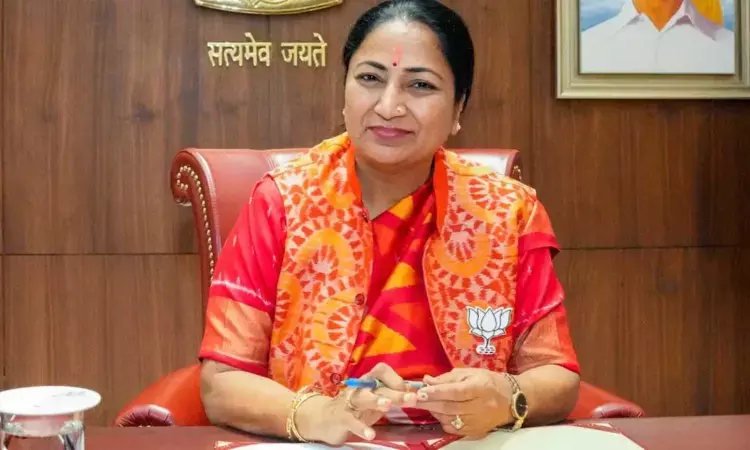- Home
- Medical news & Guidelines
- Anesthesiology
- Cardiology and CTVS
- Critical Care
- Dentistry
- Dermatology
- Diabetes and Endocrinology
- ENT
- Gastroenterology
- Medicine
- Nephrology
- Neurology
- Obstretics-Gynaecology
- Oncology
- Ophthalmology
- Orthopaedics
- Pediatrics-Neonatology
- Psychiatry
- Pulmonology
- Radiology
- Surgery
- Urology
- Laboratory Medicine
- Diet
- Nursing
- Paramedical
- Physiotherapy
- Health news
- Fact Check
- Bone Health Fact Check
- Brain Health Fact Check
- Cancer Related Fact Check
- Child Care Fact Check
- Dental and oral health fact check
- Diabetes and metabolic health fact check
- Diet and Nutrition Fact Check
- Eye and ENT Care Fact Check
- Fitness fact check
- Gut health fact check
- Heart health fact check
- Kidney health fact check
- Medical education fact check
- Men's health fact check
- Respiratory fact check
- Skin and hair care fact check
- Vaccine and Immunization fact check
- Women's health fact check
- AYUSH
- State News
- Andaman and Nicobar Islands
- Andhra Pradesh
- Arunachal Pradesh
- Assam
- Bihar
- Chandigarh
- Chattisgarh
- Dadra and Nagar Haveli
- Daman and Diu
- Delhi
- Goa
- Gujarat
- Haryana
- Himachal Pradesh
- Jammu & Kashmir
- Jharkhand
- Karnataka
- Kerala
- Ladakh
- Lakshadweep
- Madhya Pradesh
- Maharashtra
- Manipur
- Meghalaya
- Mizoram
- Nagaland
- Odisha
- Puducherry
- Punjab
- Rajasthan
- Sikkim
- Tamil Nadu
- Telangana
- Tripura
- Uttar Pradesh
- Uttrakhand
- West Bengal
- Medical Education
- Industry
Revolutionizing Dialysis: Delhi Govt to install 150 dialysis machines at 6 Hospitals

New Delhi: In a major healthcare development, the Delhi government has introduced a plan to install 300 dialysis machines across 16 government hospitals, offering free dialysis services to economically weaker sections and subsidised treatment to others.
This initiative is being implemented under the Pradhan Mantri National Dialysis Program (PMNDP) and the PPP Dialysis Project of the Delhi Government.
According to an ANI report, it includes 150 machines already operational under the Pradhan Mantri National Dialysis Programme (PMNDP) and PPP Dialysis Project, and an additional 150 machines now being added as part of improving public healthcare infrastructure, the Office of the Health Minister, Government of NCT of Delhi, stated in a release.
"We are proud to lead this effort in Delhi to ensure that life-saving dialysis is not a privilege but a right for every citizen, especially the needy people," said Dr Pankaj Kumar Singh, Minister of Health, GNCTD.
Also Read:Lady Hardinge Medical College starts Hemodialysis facility after 29 years
"No patient should be denied care due to financial hardship," he added.
The Health Minister Singh further added, "This is not just a medical service expansion; it is a promise to our people that the Delhi Government stands by their side during hardship."
Dialysis services will be provided at both existing and newly established centres across major government hospitals in Delhi. Currently, 150 dialysis machines are already operational at the following hospitals- Bhagwan Mahavir Hospital (North West), Guru Gobind Singh Govt. Hospital (West), Indira Gandhi Hospital (South West), Pt. Madan Mohan Malaviya Hospital (South), Deep Chand Bandhu Hospital (North West), Deen Dayal Upadhyay Hospital (West), Maharishi Valmiki Hospital (North), Lok Nayak Hospital (Central), Rajiv Gandhi Super Speciality Hospital (Shahdara), and Dr. Hedgewar Aarogya Sansthan (Shahdara), the release stated.
An additional 150 dialysis machines are now being installed at six more government facilities- Dr. Baba Sahib Ambedkar Hospital (North West), Jag Pravesh Chandra Hospital (North East), Burari Hospital (Central), Janakpuri Super Speciality Hospital (West), Ambedkar Nagar Hospital (South), and Sanjay Gandhi Memorial Hospital (North West).
These additions will expand the capacity and geographic reach of free and subsidised dialysis services for Delhi's citizens.
In PMNDP hospitals, patients with National Food Security Card - for PR and PRS category or Income Certificate of Annual income of less than Rupees One Lakh under BPL category, will receive dialysis services free of cost.
Whereas in government hospitals where dialysis machines have been installed under PPP model, Delhi residents who have lived in the city for at least three years (with valid proof such as Ration Card, Aadhaar, Voter ID, Driving License, Domicile Certificate, or Passport) and either hold a National Food Security Card or have an income certificate showing annual income up to Rs 3,00,000 are eligible for free dialysis.
Patients who do not meet the eligibility criteria for free dialysis can still access haemodialysis services at highly subsidised rates across these government hospitals.
To ensure seamless and quality care, the Delhi Government will also deploy radiologists, trained technicians, and support staff across all dialysis centres. "Tireless efforts are underway to transform Delhi's healthcare into a world-class system--accessible, inclusive, and future-ready," said Dr. Pankaj Kumar Singh, Minister of Health, Delhi.
Kajal Rajput joined Medical Dialogues as an Correspondent for the Latest Health News Section in 2019. She holds a Bachelor's degree in Arts from University of Delhi. She manly covers all the updates in health news, hospitals, doctors news, government policies and Health Ministry. She can be contacted at editorial@medicaldialogues.in Contact no. 011-43720751


